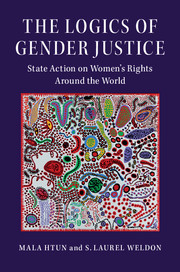Description
The Logics of Gender Justice
State Action on Women's Rights Around the World
Cambridge Studies in Gender and Politics Series
Authors: Htun Mala, Weldon S. Laurel
This book explains when and why governments around the world take action to advance - or undermine - women's rights.
Language: English
Subject for The Logics of Gender Justice:
Approximative price 31.58 €
In Print (Delivery period: 14 days).
Add to cart
The Logics of Gender Justice
Publication date: 03-2018
366 p. · 15.2x22.8 cm · Paperback
Publication date: 03-2018
366 p. · 15.2x22.8 cm · Paperback
Approximative price 101.56 €
In Print (Delivery period: 14 days).
Add to cart
The Logics of Gender Justice
Publication date: 03-2018
366 p. · 15.7x23.5 cm · Hardback
Publication date: 03-2018
366 p. · 15.7x23.5 cm · Hardback
Description
/li>Contents
/li>Biography
/li>
When and why do governments promote women's rights? Through comparative analysis of state action in seventy countries from 1975 to 2005, this book shows how different women's rights issues involve different histories, trigger different conflicts, and activate different sets of protagonists. Change on violence against women and workplace equality involves a logic of status politics: feminist movements leverage international norms to contest women's subordination. Family law, abortion, and contraception, which challenge the historical claim of religious groups to regulate kinship and reproduction, conform to a logic of doctrinal politics, which turns on relations between religious groups and the state. Publicly-paid parental leave and child care follow a logic of class politics, in which the strength of Left parties and overall economic conditions are more salient. The book reveals the multiple and complex pathways to gender justice, illuminating the opportunities and obstacles to social change for policymakers, advocates, and others seeking to advance women's rights.
1. Introduction: states and gender justice; 2. Feminist mobilization and status politics: combatting violence against women; 3. Governing women's legal status at work; 4. Doctrinal politics: religious power, the state, and family law; 5. Class politics: family leave and child care policy; 6. Reproductive rights: class, status, and doctrinal politics; 7. The multiple logics of gender justice; 8. Conclusion.
Mala Htun is Professor of Political Science at the University of New Mexico. She is the author of Inclusion without Representation in Latin America (Cambridge, 2016) and Sex and the State (Cambridge, 2003). She has been named an Andrew Carnegie Fellow, held the Council on Foreign Relations International Affairs Fellowship in Japan, and was a fellow at the Kellogg Institute of the University of Notre Dame and the Radcliffe Institute of Harvard. She has received grants from the National Science Foundation, the National Institutes of Health, and the Norwegian Research Council.
S. Laurel Weldon is Distinguished Professor of Political Science and Director of the Purdue Policy Research Institute at Purdue University. Weldon has authored more than twenty articles and book chapters and two books, including When Protest Makes Policy: How Social Movements Represent Disadvantaged Groups (2011), which won the Victoria Schuck Award. She is co-editor of The Oxford Handbook on Gender and Politics (2013) and of the journal Politics, Groups and Identities. She has served on the editorial board of the American Political Science Review, Politics & Gender, Women, Politics and Policy and the European Journal of Politics and Gender.
S. Laurel Weldon is Distinguished Professor of Political Science and Director of the Purdue Policy Research Institute at Purdue University. Weldon has authored more than twenty articles and book chapters and two books, including When Protest Makes Policy: How Social Movements Represent Disadvantaged Groups (2011), which won the Victoria Schuck Award. She is co-editor of The Oxford Handbook on Gender and Politics (2013) and of the journal Politics, Groups and Identities. She has served on the editorial board of the American Political Science Review, Politics & Gender, Women, Politics and Policy and the European Journal of Politics and Gender.
© 2024 LAVOISIER S.A.S.




